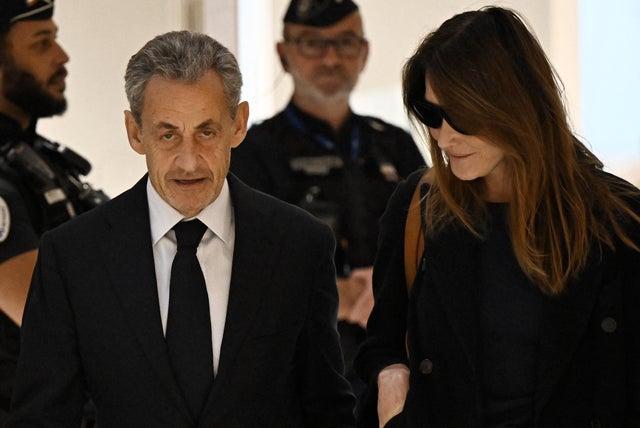In a landmark decision, a Paris court has ruled that former French President Nicolas Sarkozy must begin serving his prison sentence immediately, regardless of ongoing appeals. This ruling marks a significant moment in French judicial history, underscoring the judiciary’s determination to enforce accountability at the highest levels of government. The development comes amid continued legal challenges surrounding Sarkozy’s convictions, raising important questions about the intersection of politics and justice in France.
Paris Court Upholds Prison Order Against Former President Sarkozy Despite Pending Appeal
The Paris Court has maintained its decision to enforce the prison sentence on former French President Nicolas Sarkozy despite his ongoing appeal. This ruling highlights the judiciary’s stance that the sentence should be served immediately, reflecting a rare and resolute approach towards high-profile political figures. Authorities have emphasized that the law applies equally to all citizens, underscoring the importance of accountability at the highest levels of government.
Key aspects of the court’s ruling include:
- Prison order comes into effect immediately, even while the appeal is under review.
- The decision is considered unprecedented for a former head of state in France.
- Legal experts anticipate potential ramifications for the political landscape and judicial process in upcoming cases.
| Case Element | Details |
|---|---|
| Sentence Duration | 3 years (1 year suspended) |
| Offense | Corruption and influence peddling |
| Appeal Status | Pending |
Legal Experts Analyze the Implications of Immediate Incarceration for High-Profile Political Figures
The recent ruling by the Paris court mandating immediate incarceration for former French President Nicolas Sarkozy, despite ongoing appeals, has sparked intense debate among legal experts. This unprecedented decision challenges traditional norms surrounding the treatment of high-profile political figures within the justice system. Many analysts argue that it sets a significant precedent, emphasizing the principle that no individual is above the law. Meanwhile, others warn of potential risks, including the erosion of due process rights and the perception of judicial impartiality in politically charged cases.
Legal scholars highlight several key implications of this development:
- Acceleration of Judicial Proceedings: The ruling may prompt courts to expedite decisions, raising questions about the balance between swift justice and thorough review.
- Impact on Political Stability: Immediate incarceration of prominent figures can lead to heightened political tensions and public unrest.
- Reevaluation of Appeal Rights: This case could influence future legislation on when appeals delay the start of prison sentences.
| Aspect | Potential Impact |
|---|---|
| Judicial Independence | Strengthened, but under intense scrutiny |
| Public Perception | Divided, between justice served and politicized trials |
| Legal Precedents | New benchmarks on incarceration during appeals |
Potential Impact on French Judicial Precedents and Political Accountability
The Paris court’s decision to mandate immediate imprisonment for former President Nicolas Sarkozy, despite his right to appeal, marks a significant shift in French judicial practice. Traditionally, the French legal system has allowed convicted individuals to remain free while appeals are processed, preserving their presumption of innocence until the final verdict. This ruling challenges that norm and sets a new precedent that could compel other high-profile figures to serve sentences without delay, potentially accelerating the administration of justice in politically sensitive cases.
Moreover, this ruling intensifies scrutiny on political accountability in France, sending a strong message that no individual is above the law, regardless of their former status. It could serve as a deterrent to abuse of power and elevate public trust in judicial impartiality. Key implications include:
- Enhanced legal rigor in processing appeals from political figures.
- Potential increase in immediate enforcement of sentences in corruption and abuse-of-power cases.
- Heightened political transparency through judiciary independence.
- Pressure on political parties to address ethics within their ranks rigorously.
| Aspect | Implication |
|---|---|
| Judicial Norms | Shift towards immediate imprisonment despite appeals |
| Political Accountability | Stronger enforcement of ethical standards for politicians |
| Public Trust | Potential boost in confidence toward judiciary independence |
Recommendations for Navigating Legal Challenges in High-Stakes Political Cases
In politically charged trials, ensuring a meticulous approach to legal strategy is paramount. Defendants and their legal teams should prioritize comprehensive case evaluation, transparent communication, and proactive public relations management to maintain credibility and trust throughout the proceedings. It is advisable to engage experienced counsel who specialize in high-profile political litigation, as the complexities often extend beyond traditional criminal defense, requiring a nuanced understanding of political implications and media dynamics.
Moreover, navigating stringent court orders, such as immediate prison sentences despite pending appeals, demands careful planning and swift action. Legal teams must prepare for accelerated post-conviction motions while simultaneously managing the appeal process to safeguard their client’s rights. The following table outlines core recommendations for defense teams handling such cases:
| Key Focus Area | Recommended Action | Expected Outcome |
|---|---|---|
| Legal Strategy | Thorough case review & tailored defense tactics | Stronger courtroom positioning |
| Public Relations | Transparent updates & controlled media messaging | Maintained public trust |
| Appeal Handling | Immediate filing & preparation for expedited hearings | Preserved appeal rights |
| Client Support | Continuous psychological & legal counseling | Endured resilience during proceedings |
The Way Forward
The ruling by the Paris court marks a significant moment in French political and judicial history, underscoring the legal accountability of former President Nicolas Sarkozy. Despite his intention to appeal, the court’s decision that he must begin serving his prison sentence immediately sends a clear message about the enforcement of justice regardless of status. As the legal process continues, the case will remain closely watched both in France and internationally, highlighting ongoing efforts to uphold transparency and rule of law at the highest levels of government.




